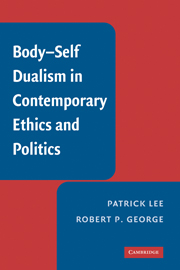Introduction
Published online by Cambridge University Press: 27 July 2009
Summary
Profoundly important ethical issues turn on the question whether biological life is an essential and intrinsic aspect of a human person or is only an extrinsic instrument. Consider, for example, the controversy concerning abortion. A key issue, of course, is the status of the developing human embryo or fetus that is deliberately destroyed by induced abortion. If the human person is not a particular type of organism, then one could hold that a human organism begins to exist at one time while the human person begins to exist at a later time. If, however, a human person is (whatever else he or she may be) a particular type of organism, then whenever the human organism begins to exist that is the time that the human person begins to exist. Now, consider the issue at the other “edge of life,” namely, euthanasia. Here the issue is the status of the severely debilitated and, perhaps, permanently unconscious or minimally conscious individual. A supporter of euthanasia might look at such an individual and say, “that's the same living organism that used to be grandfather, but that is not grandfather anymore.” The assumption the euthanasia supporter is making is that the “person” is something distinct from the living human organism, albeit associated with it, namely, the consciousness or perhaps a spiritual entity. If we reject that assumption and regard the human person as a particular type of bodily being, a particular type of organism, then the living human individual remains grandfather – the person – and is entitled, from an ethical vantage point, to be treated as such, despite his debilitated condition.
- Type
- Chapter
- Information
- Publisher: Cambridge University PressPrint publication year: 2007



